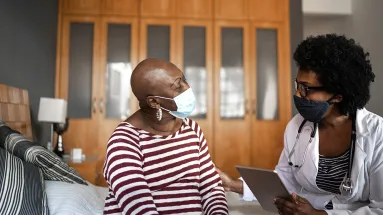How to Make the Most of Your Time With Your Care Team
How to Make the Most of Your Time With Your Care Team

If you’re living with cancer, appointments with your care team offer precious time to ask questions and receive updates on how you are doing.
Making the most of this time with your care team can help you take control of your health care journey, become an active partner in your treatment plan, and empower yourself as a cancer survivor.
Planning for your appointment and questions you might have is important. “I find that when patients are organized and come in with a list of questions, it’s much easier to get through things and for them to get some peace of mind, rather than when they’re trying to rely on their memory,” said Dr. Parvin Peddi, director of Breast Medical Oncology at Providence Saint John’s Cancer Institute.
Here are some Microsteps you can take to help you maximize this time:
Taking notes during your appointments. You may want to take notes yourself, or you could bring a trusted friend or family member to the appointment to take notes for you. You could also ask the physician if it’s possible to record the visit on your phone so you can listen and process the information later.” You may want to get into the habit of bringing a notepad and pen to all your appointments or having your notes app open on your phone.
Writing down your questions in order of priority before your appointment. Having your queries with you, either in a notebook or using an app on your phone, can help you be fully prepared so you cover all your concerns without forgetting anything during the meeting.
Allowing extra time on your calendar for your appointments.
Your appointment with your care team could take longer than you anticipated, so consider blocking off a little extra time on your calendar. Planning for delays may help you feel less stressed about time away from home or work.
Asking clear and direct questions.
Your care team is there to support you, so you shouldn't be nervous about asking specific questions about treatment options related to your condition. Ask questions until you are sure you understand. And don’t feel bad if you need to ask the same question again. If you’re having trouble understanding, ask your care team if something can be described with a picture or other visual aid.
Mentioning all your physical and mental symptoms, even those your care team hasn’t asked about.
Even if you think your symptoms may be trivial or unrelated to your cancer, sharing them with your care team is important. This way, your doctor is fully informed about what you are experiencing and can take everything into consideration while planning your treatment with you.
Confirming next steps with your care team before leaving.
By repeating key details, you can be sure you have interpreted the information correctly. If something is unclear, try repeating it back to your doctor. This is called “mirroring” and is sometimes effective in clarifying what is being said. You might start with the words, “So you mean I should…” or “So I think you are suggesting that…”
Developed with Thrive Global













